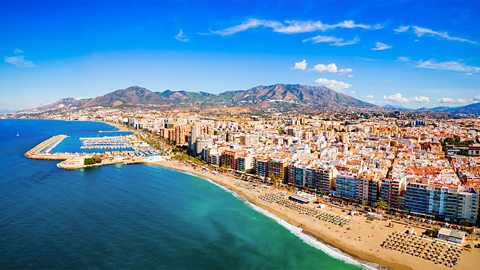Key points about describing the environment in Spanish
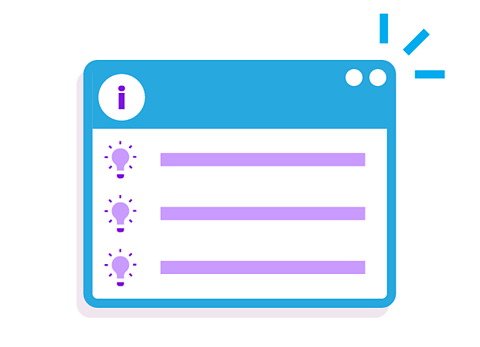
Use modal verbShows possibility, intent, ability, or necessity. Used alongside the infinitive form of the main verb of a sentence. Common examples of modal verbs include can, should, and must. to express what you are able to do, can do, have to do or must do to help the enviornment.
Use the different verb tenseThe verb formation that describes the time at which the action occurred, eg past, present or future. and time indications to talk about actions taken in the present, past or future to live more sustainably.
This guide contains a video as well as reading and listening practice.
Video - Environmental issues
Watch the video of Laura talking about the risk to the environment in her town in Colombia and suggesting some potential solutions.
Laura talks about the environment using present tense and conditional tense verbs
Hola, me llamo Laura y soy de Honda, una pequeƱa ciudad en Colombia.
Estudio agroecologĆa en la universidad y me apasiona el medio ambiente.
Colombia es muy rica en biodiversidad y naturaleza.
AquĆ en Honda vivimos en una zona volcĆ”nica, por lo que el suelo es muy rico y podemos cultivar mango, papaya, limĆ³n, entre otras muchas otras frutas y verduras.
Los pescadores en Honda son conscientes de cuidar al medio ambiente.
Laura: ĀæHola, cĆ³mo le ha ido en la pesca hoy?
Pescador: Pues bien, mira.
Los pescadores cuidan de los peces y si pescan uno muy pequeƱo, lo vuelven a echar al rĆo.
Pescador: Claro, yo cuido el rĆo porque vivo de Ć©l.
Yo trato de ser consciente del medio ambiente con acciones en mi casa, haciendo reciclaje.
Me gustarĆa tener mĆ”s proyectos que cuiden mi ciudad.
Si pudiera cambiar algo, serĆa promover el uso de bicicletas. En mi opiniĆ³n son mejores para el medioambiente.
Recepcionista: Hola.
Laura: Hola.
Recepcionista: Bienvenida al museo del rĆo Magdalena. Te doy la bienvenida, adelante.
Tengo la suerte de vivir en un pueblo con zonas verdes, poco ruido y poca contaminaciĆ³n, a diferencia de las grandes ciudades.
Trato de hacer mi parte para cuidar del medioambiente.
Ā”Mira! AquĆ estĆ” Honda en la pared.
Translation:
Hi, my name is Laura, and I am from the small town of Honda, in Colombia.
I am at university studying agroecology and Iām passionate about the environment.
Colombia is so rich in biodiversity and nature.
Here in Honda we live in a volcanic area so the soil is very rich. We can grow mango, papaya, lime, among many other fruits and vegetables.
Fishermen in Honda are environmentally conscious.
Laura: Hi, how is the fishing today?
Fisherman: Good, have a look.
The fishermen take care of the fish and if they catch a very small one, they return it to the river.
Fisherman: Of course, I take care of the environment because I make my living from it.
I try to be environmentally conscious with actions at home, recycling.
I would like to have more projects that take care of my city.
If I could change something, Iād like to foster the use of bicycles. In my opinion, they are better for the environment.
Receptionist: Hello.
Laura: Hello.
Receptionist: Welcome to the River Magdalena museum. Go ahead.
I am lucky to live in a town with green spaces, little noise and pollution, as opposed to big cities.
I try to do my bit to care for the environment.
Look! Honda is here on the wall.
Vocabulary - The environment and climate change
Useful vocabulary for describing environmental and climate change issues include:
| Spanish | English | Spanish | English |
|---|---|---|---|
| Sorry, something went wrongCheck your connection, refresh the page and try again. | action, act | Sorry, something went wrongCheck your connection, refresh the page and try again. | government |
| Sorry, something went wrongCheck your connection, refresh the page and try again. (feminine) | water | Sorry, something went wrongCheck your connection, refresh the page and try again. | industry |
| Sorry, something went wrongCheck your connection, refresh the page and try again. | climate | Sorry, something went wrongCheck your connection, refresh the page and try again., Sorry, something went wrongCheck your connection, refresh the page and try again. | environment |
| Sorry, something went wrongCheck your connection, refresh the page and try again. | pollution | Sorry, something went wrongCheck your connection, refresh the page and try again. | landscape |
| Sorry, something went wrongCheck your connection, refresh the page and try again. | harm, damage | Sorry, something went wrongCheck your connection, refresh the page and try again. | danger |
| Sorry, something went wrongCheck your connection, refresh the page and try again. | illness | Sorry, something went wrongCheck your connection, refresh the page and try again. | river |
| Sorry, something went wrongCheck your connection, refresh the page and try again. | species | Sorry, something went wrongCheck your connection, refresh the page and try again. | noise |
| Sorry, something went wrongCheck your connection, refresh the page and try again. | factory | Sorry, something went wrongCheck your connection, refresh the page and try again. | traffic |
| Sorry, something went wrongCheck your connection, refresh the page and try again. | fire | Sorry, something went wrongCheck your connection, refresh the page and try again. | earth, land, ground |
Useful verbs for describing the environment and climate change include:
| Spanish | English | Spanish | English |
|---|---|---|---|
| Sorry, something went wrongCheck your connection, refresh the page and try again. | to affect | Sorry, something went wrongCheck your connection, refresh the page and try again. | to avoid, prevent |
| Sorry, something went wrongCheck your connection, refresh the page and try again. | to support | Sorry, something went wrongCheck your connection, refresh the page and try again. | to manufacture, fabricate |
| Sorry, something went wrongCheck your connection, refresh the page and try again. | to increase | Sorry, something went wrongCheck your connection, refresh the page and try again. | to clean |
| Sorry, something went wrongCheck your connection, refresh the page and try again. | to help | Sorry, something went wrongCheck your connection, refresh the page and try again. | to achieve |
| Sorry, something went wrongCheck your connection, refresh the page and try again. | to change | Sorry, something went wrongCheck your connection, refresh the page and try again. | to fight, struggle |
| Sorry, something went wrongCheck your connection, refresh the page and try again. | to cause | Sorry, something went wrongCheck your connection, refresh the page and try again. | to improve |
| Sorry, something went wrongCheck your connection, refresh the page and try again. | to drive | Sorry, something went wrongCheck your connection, refresh the page and try again. | to die |
| Sorry, something went wrongCheck your connection, refresh the page and try again. | to build | Sorry, something went wrongCheck your connection, refresh the page and try again. | to need |
| Sorry, something went wrongCheck your connection, refresh the page and try again. | to pollute, contaminate | Sorry, something went wrongCheck your connection, refresh the page and try again. | to prevent, forbid |
| Sorry, something went wrongCheck your connection, refresh the page and try again. | to care for, take care of | Sorry, something went wrongCheck your connection, refresh the page and try again. | to reduce |
| Sorry, something went wrongCheck your connection, refresh the page and try again. | to have to, must | Sorry, something went wrongCheck your connection, refresh the page and try again. | to breathe |
| Sorry, something went wrongCheck your connection, refresh the page and try again. | to let, leave | Sorry, something went wrongCheck your connection, refresh the page and try again. | to save |
| Sorry, something went wrongCheck your connection, refresh the page and try again. | to destroy, ruin |
Grammar - Modal verbs and how to use them

Modal verbs in English include 'can', 'should' and 'must'. They express the speakerās feeling towards an action, such as to be able to/can or to have to/must. Modal verbs indicate modality, ability, necessity, possibility, obligation or permission.
Modal verbs can work on their own, or with another verb that is always in the infinitiveForm of the verb that has not been conjugated. Usually translated with 'to' in English, eg to play.. For example:
Debo reciclar mƔs. - I must recycle more.
Debemos coger el transporte pĆŗblico en vez de viajar en coche ā We must take public transport instead of travelling by car.
Podemos reducir el agua que usamos ā We can reduce the water that we use
Quiero evitar los fuegos en los bosques ā I want to avoid fires in the woods
ĀæSabes como ayudar a las especies en peligro? ā Do you know how to help endangered species?

Modal verbs as impersonal verbs
Modal verbs also work as impersonal verbs in the third person singularRefers to only one object or person., followed by an infinitive. For example:
Se puede recoger basura en el parque. ā You (one) can pick up rubbish in the park.
Se debe ducharse en vez de baƱarse. ā You (one) can have a shower instead of having a bath.
No se debe tirar basura en la calle. ā You (one) must not throw rubbish in the street.
Have a look at the Impersonal verbs in Spanish guide to learn more about these verbs.
Key modal verbs include:
querer - to want
deber - to have to, must
poder - to be able to, can
saber - to know
Click or tap on Show more to see how to conjugate these four key modal verbs.
| querer (to want) | deber (to have to, must) | poder (to be able, can) | saber (to know) |
|---|---|---|---|
| quiero (I want) | debo (I must) | puedo (I can) | ²õĆ© (I know) |
| quieres (you want) | debes (you must) | puedes (you can) | sabes (you know) |
| quiere (he/she wants) | debe (he/she must) | puede (he/she can) | sabe (he/she knows) |
| queremos (we want) | debemos (we must) | podemos (we can) | sabemos (we know) |
| ±ē³Ü±š°łĆ©¾±²õ (you plural want) | »å±š²śĆ©¾±²õ (you plural must) | ±č“Ē»åĆ©¾±²õ (you plural can) | ²õ²¹²śĆ©¾±²õ (you plural know) |
| quieren (they want) | deben (they must) | pueden (they can) | saben (they know) |
Modal verbs - Mini quiz
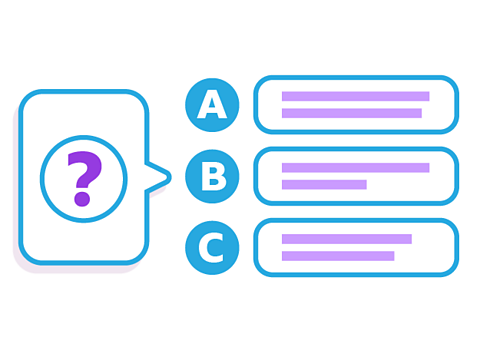
Complete the following sentences:
_________ recoger basura en la calle.
I can pick up rubbish in the street.
Puedo recoger basura en la calle.
Puedo is the āIā form of the modal verb poder and means āI canā.
_______ reducir la contaminaciĆ³n del aire en la ciudad.
You (one) must reduce air pollution in the town.
Se debe reducir la contaminaciĆ³n del aire en la ciudad.
Se debe is the impersonal verb meaning āyou (one) mustā.
Find out more about modal verbs and the infinitive in the Infinitives in Spanish guide.
Reading practice
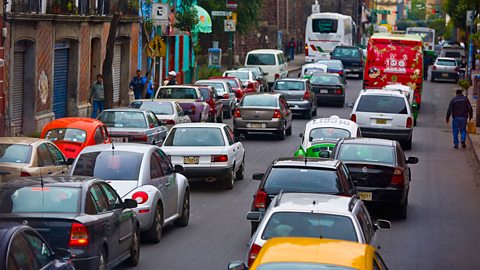
Read this text about pollution and water shortage in Mexico City and answer the questions below.
Un problema del medio ambiente en la Ciudad de MĆ©xico es la contaminaciĆ³n del aire. Esto se debe principalmente al aumento en el nĆŗmero de coches. AdemĆ”s, se han construido numerosas fĆ”bricas e instalaciones industriales. Como consecuencia, hay menos espacios verdes en la ciudad cada aƱo, que afecta la salud de los habitantes.
Hay tambiĆ©n un problema con la falta de agua en la Ciudad de MĆ©xico. Las grandes empresas extraen agua del suelo para fabricar bebidas, y como resultado no hay bastante agua para la gente en la ciudad. El gobierno distribuye agua a la gente pero no es de buena calidad y es marrĆ³n.

Answer the questions in English.
What change has happened to affect air pollution in Mexico City?
In addition, what has happened which has also made air pollution worse?
What reason is given for the lack of water in Mexico City?
What is the water like that people are provided with? (2 details)
- There has been an increase in the number of cars.
Evidence from the text: ā¦principalmente al aumento en el nĆŗmero de coches. - ā¦principally the increase in the number of cars.
- The construction of factories and industrial facilities.
Evidence from the text: AdemƔs, se han construido numerosas fƔbricas e instalaciones industriales - In addition, numerous factories and industrial facilities have been built.
- Large companies extracting water to use for manufacturing drinks is causing a lack of water.
Evidence from the text: Las grandes empresas extraen agua del suelo para fabricar bebidas, y como resultado no hay bastante agua para la gente en la ciudad. - Large companies extract water from the ground to make drinks, and as a result there is not enough water for people in the city.
- The water is of poor (not good) quality and is brown.
Evidence from the text: El gobierno distribuye agua a la gente pero no es de buena Calidad y es marrĆ³n ā The government distributes water to the people but it is not of good quality and is brown.
Vocabulary - Reducing, reusing and recycling waste
Useful nouns for talking about reducing waste, reusing and recycling include:
| Spanish | English | Spanish | English |
|---|---|---|---|
| Sorry, something went wrongCheck your connection, refresh the page and try again. (feminine) | water | Sorry, something went wrongCheck your connection, refresh the page and try again. | energy |
| Sorry, something went wrongCheck your connection, refresh the page and try again. | rubbish, garbage | Sorry, something went wrongCheck your connection, refresh the page and try again. | light |
| Sorry, something went wrongCheck your connection, refresh the page and try again. | plastic bag | Sorry, something went wrongCheck your connection, refresh the page and try again. | plastic |
| Sorry, something went wrongCheck your connection, refresh the page and try again. | bottle | Sorry, something went wrongCheck your connection, refresh the page and try again. | chemicals |
| Sorry, something went wrongCheck your connection, refresh the page and try again. | harm | Sorry, something went wrongCheck your connection, refresh the page and try again. | resources |
| Sorry, something went wrongCheck your connection, refresh the page and try again. | rubbish, waste | Sorry, something went wrongCheck your connection, refresh the page and try again. | glass |
Useful verbs include:
| Spanish | English | Spanish | English |
|---|---|---|---|
| Sorry, something went wrongCheck your connection, refresh the page and try again. | to save | Sorry, something went wrongCheck your connection, refresh the page and try again. | to collect/pick up |
| Sorry, something went wrongCheck your connection, refresh the page and try again. | to switch off | Sorry, something went wrongCheck your connection, refresh the page and try again. | to reduce |
| Sorry, something went wrongCheck your connection, refresh the page and try again. | to turn off the taps | Sorry, something went wrongCheck your connection, refresh the page and try again., Sorry, something went wrongCheck your connection, refresh the page and try again. | to reuse |
| Sorry, something went wrongCheck your connection, refresh the page and try again. | to avoid | Sorry, something went wrongCheck your connection, refresh the page and try again. | to throw away |
| Sorry, something went wrongCheck your connection, refresh the page and try again. | to clean | Sorry, something went wrongCheck your connection, refresh the page and try again. | to try |
| Sorry, something went wrongCheck your connection, refresh the page and try again. | to recycle | Sorry, something went wrongCheck your connection, refresh the page and try again., Sorry, something went wrongCheck your connection, refresh the page and try again. | to use |
All Foundation Tier vocabulary listed in this guide can be found on the vocabulary sheet below.
Grammar - Verbs in the past, present and future tenses
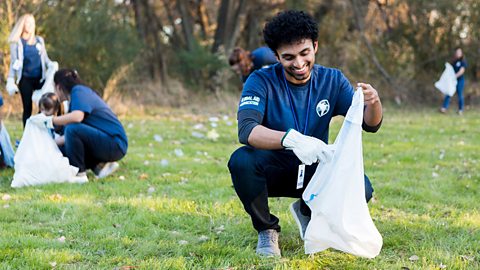
Use the different verb tenses to work out when actions took place, take place or when they will take place.
Actions in the past
Examples in the preterite tenseForm of the verb that describes completed actions in the past.
ReciclƩ el papel. - I recycled paper.
RecogĆ basura. - I picked up litter.
Examples in the imperfect tenseUsed to describe things in the past, actions that used to happen regularly or an incomplete action.
Reciclaba el papel - I used to recycle paper.
RecogĆa basura - I used to pick up litter.
Actions in the present
Riciclo el papel - I recycle paper.
Recojo basura - I pick up litter.
Actions in the future
Examples in the immediate future tenseUsed to describle what someone is going to do in the near future, eg I am going to watch, he is going to arrive. Formed with the present tense of 'ir' (to go), followed by 'a' and the infinitive.
Voy a reciclar el papel.āÆ- I am going to recycle paper.
Voy a recoger basura. - I'm going to pick up litter.
Examples in the simple future tenseUsed to talk about actions that will take place in the future.
ReciclarƩ el papel. I will recycle paper.
RecogerƩ basura. - I will pick up litter.

Time indicators can also give clues as to whether the speaker is referring to past, present or future actions:
| Past | Present | Future |
|---|---|---|
| antes - before, previously | ahora - now | en el futuro - in the future |
| el aƱo pasado - last year | este aƱo - this year | el aƱo que viene - next year |
| la semana pasada - last week | esta semana - this week | la semana que viene - next week |
| ayer - yesterday | hoy - today | ³¾²¹Ć±²¹²Ō²¹ - tomorrow |
Listening practice
Mexican students Laura and Pablo are talking about actions they take to help the environment.
Listen to each person and work out what they say about:
what they have done in the past
what they are doing now
what they will do in the future
Complete the tables in English.
Laura
| Past | Present | Future |
|---|---|---|
| . |
| Past | Present | Future |
|---|---|---|
| Picked up litter in the park | Recycles glass and paper | Will walk to school |
Feedback
El aƱo pasado at the start of the sentence and the imperfect ending on °ł±š³¦“Ē²µĆ²¹³¾“Ē²õ indicate that 'picking up litter' happened in the past.
Ahora and the present tense ending of reciclo tell you that 'recycling glass and paper' is what Laura does now.
El aƱo que viene and the use of voy a and the infinitive indicate that 'going to school on foot' is going to happen in the future.
Pablo
| Past | Present | Future |
|---|---|---|
| . |
| Past | Present | Future |
|---|---|---|
| Used to save water | Avoids using chemicals | Will only use rechargeable batteries |
Feedback
Listen to this item carefully as Pablo mentions the three activities in a different order from the table.
Ahora and the present tense ending on evito are the clues that 'avoiding the use of chemical products' happens in the present.
En el futuro and the future ending on ³Ü³Ł¾±±ō¾±³ś²¹°łĆ© indicate that 'using rechargeable batteries' will happen in the future.
Antes and the imperfect tense of trataba de ahorrar indicate that 'saving water' was something he did in the past.
Click or tap on Show more to read the transcript and translation of what Laura and Pablo say.
Laura - transcript
El aƱo pasado yo era miembro de un grupo de voluntarios y cada sĆ”bado °ł±š³¦“Ē²µĆ²¹³¾“Ē²õ basura en el parque, pero tuve que dejarlo porque ahora tengo demasiado trabajo.
Sin embargo, siempre reciclo el vidrio y el papel.
El aƱo que viene voy a ir al colegio a pie en vez de ir en coche.
ĀæY tĆŗ, Pablo? ĀæQuĆ© haces tĆŗ?
Translation
Last year, I was a member of a group of volunteers and every Saturday we used to pick up litter in the park, but I had to leave it because I've got too much work now.
However, I always recycle glass and paper.
Next year, I'm going to walk to school instead of going by car.
And what about you, Pablo? What do you do?
Pablo - transcript
Pues, ahora siempre evito el uso de productos quĆmicos y he decidido que en el futuro solo ³Ü³Ł¾±±ō¾±³ś²¹°łĆ© pilas recargables.
Antes no hacĆa mucho, pero siempre trataba de ahorrar agua porque es un recurso muy importante.
Translation
Well, now I always avoid using chemical products/chemicals and I've decided that in the future, I will only use rechargeable batteries.
Previously I didn't do a lot but I always used to try to save water because it's a very important resource.
Vocabulary sheet
Click or tap on the image below for a list of useful vocabulary to use when talking about the environment.

Higher Tier - Vocabulary - Talking about the environment
Useful vocabulary for describing environmental and climate change issues include:
| Spanish | English |
|---|---|
| Sorry, something went wrongCheck your connection, refresh the page and try again., Sorry, something went wrongCheck your connection, refresh the page and try again. | consequence, as a result |
| Sorry, something went wrongCheck your connection, refresh the page and try again. | smoke |
| Sorry, something went wrongCheck your connection, refresh the page and try again. | fire |
| Sorry, something went wrongCheck your connection, refresh the page and try again. | protest |
| Sorry, something went wrongCheck your connection, refresh the page and try again. | planet |
| Sorry, something went wrongCheck your connection, refresh the page and try again. | pressure |
Useful verbs for describing the environment and climate change include:
| Spanish | English |
|---|---|
| Sorry, something went wrongCheck your connection, refresh the page and try again. | to act |
| Sorry, something went wrongCheck your connection, refresh the page and try again. | to warn |
| Sorry, something went wrongCheck your connection, refresh the page and try again. | to emit |
| Sorry, something went wrongCheck your connection, refresh the page and try again. | to prevent |
| Sorry, something went wrongCheck your connection, refresh the page and try again. | to burn |
| Sorry, something went wrongCheck your connection, refresh the page and try again. | to survive |
| Sorry, something went wrongCheck your connection, refresh the page and try again. | to fear |
All Foundation and Higher Tier vocabulary listed in this guide can be found on the vocabulary sheet below.
Higher Tier - Vocabulary sheet
Click or tap on the image below for a list of useful Higher Tier vocabulary to use when talking about the environment.

Now you have revised the important vocabulary and key grammar points for talking about the environment why not have a look at the Talking about life at school in Spanish?
More on The environment and where people live
Find out more by working through a topic
- count1 of 2
